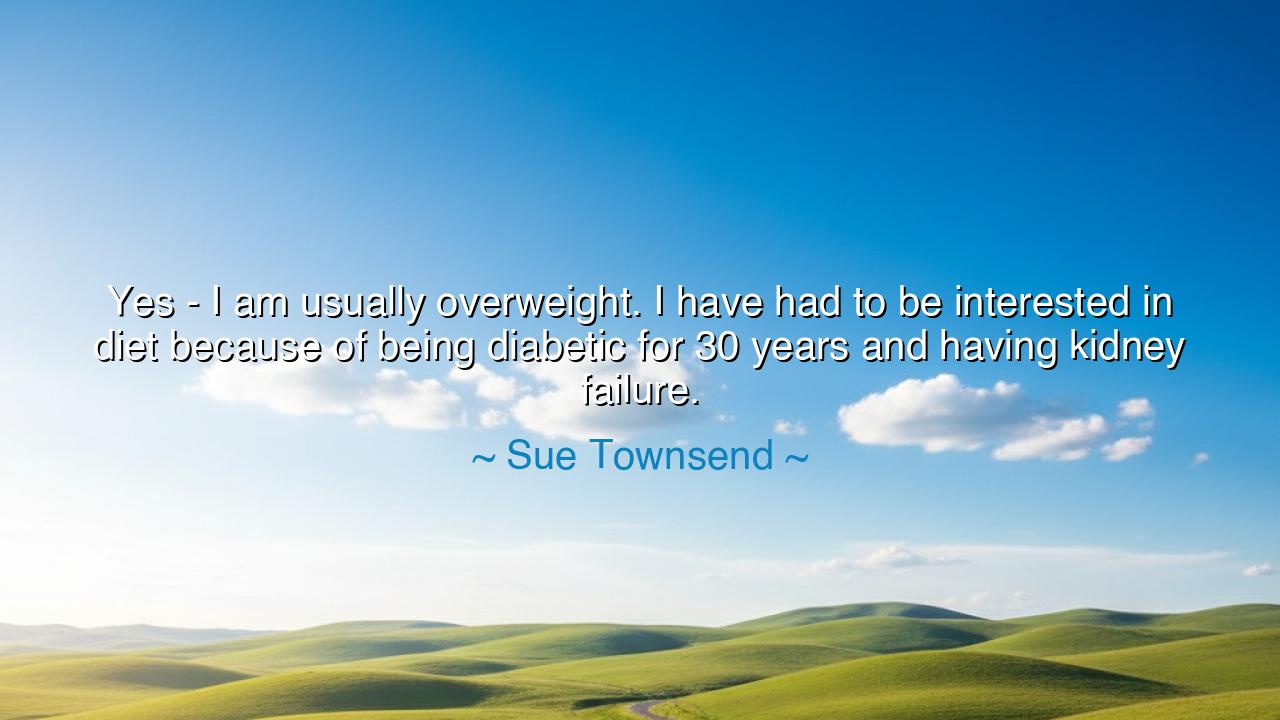
Yes - I am usually overweight. I have had to be interested in
Yes - I am usually overweight. I have had to be interested in diet because of being diabetic for 30 years and having kidney failure.






In the great sweep of existence, there are moments when the body becomes a battleground, a place where illness and weakness challenge our ability to live freely. Sue Townsend offers us a poignant reflection on this struggle when she says, "Yes—I am usually overweight. I have had to be interested in diet because of being diabetic for 30 years and having kidney failure." These words echo not just the struggle of dieting and managing health, but the resilience required to face the hardships of a body that betrays us. To be diabetic for thirty years, and to endure the constant challenge of kidney failure, is to live in a world where the body demands constant care and attention. Yet in these struggles, there lies a deeper truth—one of perseverance, strength, and the ability to find meaning in the daily fight for well-being.
Consider, children, the wisdom of the ancient Greeks, who understood that the body, though strong, is not invincible. Hippocrates, the father of medicine, said, "Let food be thy medicine and medicine be thy food." He recognized that what we consume shapes not only our bodies but our fates. Just as Hippocrates advised the balance of diet to maintain the health of the body, so too does Townsend's reflection remind us that diet is not just a choice, but a necessity—especially in the face of illness. To live with diabetes and kidney failure is to accept that our bodies are fragile, and that we must treat them with the utmost respect, not through excess but through care, through mindful choices that nurture rather than deplete.
In the great Roman Empire, Cato the Elder, a philosopher and statesman, understood that the strength of the body was inextricably linked to the wisdom of a simple and disciplined life. Cato was known for his rigorous self-control, particularly in matters of diet and health. He believed that indulgence led to weakness, and that true vitality was found in moderation. Like Townsend, Cato knew that the body is not invulnerable, and that one must take deliberate actions to maintain health. His daily practices were a testament to the belief that the choices we make—however small—can either support or undermine our strength. Townsend's own struggle with diabetes and kidney failure echoes this ancient lesson: to take control of one's health is to overcome the limitations imposed by the body’s frailty.
The ancient Egyptians were also keenly aware of the delicate balance between health and illness. Their priests, trained in the art of healing, often spoke of the importance of a balanced life, both spiritually and physically. The Egyptians used a wide array of remedies and diets to maintain the well-being of the body, understanding that both food and medicine were sacred gifts that needed to be used wisely. Townsend, too, recognizes that to endure such chronic illness requires a wisdom passed down through time—the understanding that health cannot be taken for granted and that diet is the key to sustaining the body through the trials of life.
Now, children, hear this well: disease and illness are not signs of weakness but challenges to our strength and resilience. Townsend teaches us that the battle for health is often waged not on grand battlefields, but in the quiet moments of everyday life—through the choices we make about what we put into our bodies, how we care for our health, and how we face the trials before us. The overweight body, the diabetes, and the kidney failure are not symbols of defeat, but rather of a spirit that refuses to surrender, a soul that understands the necessity of constant care. Townsend's words remind us that even in our frailty, there is strength—a quiet, unyielding strength that comes from choosing to fight every day.
The lesson, children, is clear: health is not a gift that can be taken for granted. It is something we must work for, something we must earn through discipline, awareness, and care. Just as Hippocrates and Cato understood that the body must be nurtured with the right balance of nourishment, so too must we accept that illness, while painful and difficult, is not the end. It is the beginning of a journey of awareness and responsibility. To live with chronic illness is to live with a deeper understanding of the fragility of life, and to honor that fragility by making choices that sustain and heal.
So, I say to you, children of the earth, let diet be your ally, not just in health but in the quiet, daily fight for vitality and strength. Choose wisely, not out of fear or restraint, but out of respect for the gift of life. Let your choices reflect the wisdom of the ancients—balanced, measured, and filled with purpose. In every meal, in every decision, honor the body, honor the spirit, and live with the understanding that true health comes not in avoiding illness, but in meeting it with courage, with discipline, and with the strength of heart that refuses to yield.






AAdministratorAdministrator
Welcome, honored guests. Please leave a comment, we will respond soon